Do you have skunks lurking around your shed? These troublesome critters can be a big nuisance, making loud noises at night and threatening the safety of your family. If you think that skunks have managed to make their way under your shed, then don’t worry – we’re here to help! In this blog post, we will provide a comprehensive overview on how to get rid of those pesky skunks without having to resort to professional assistance. From identifying signs of an infestation, through humane traps and repellents – we’ve got all the tips and tricks you need! So keep reading if you want helpful advice on how to effectively and swiftly deal with any unwelcome visitors living in or near your shed once and for all.
Are Skunks Dangerous?
Skunks are not usually aggressive, but they can become so if they feel threatened. It is important to take precautions when dealing with skunks. They are known to carry diseases like rabies and leptospirosis, both of which can be passed on to humans or pets. Skunks also have powerful odor glands that secrete a very pungent smell when they feel threatened.
If a skunk feels trapped or cornered, it may spray its scent as a defensive mechanism. For safety reasons, it’s advisable to wear protective gear like gloves and masks and maintain a safe distance while trying to remove them from beneath your shed.
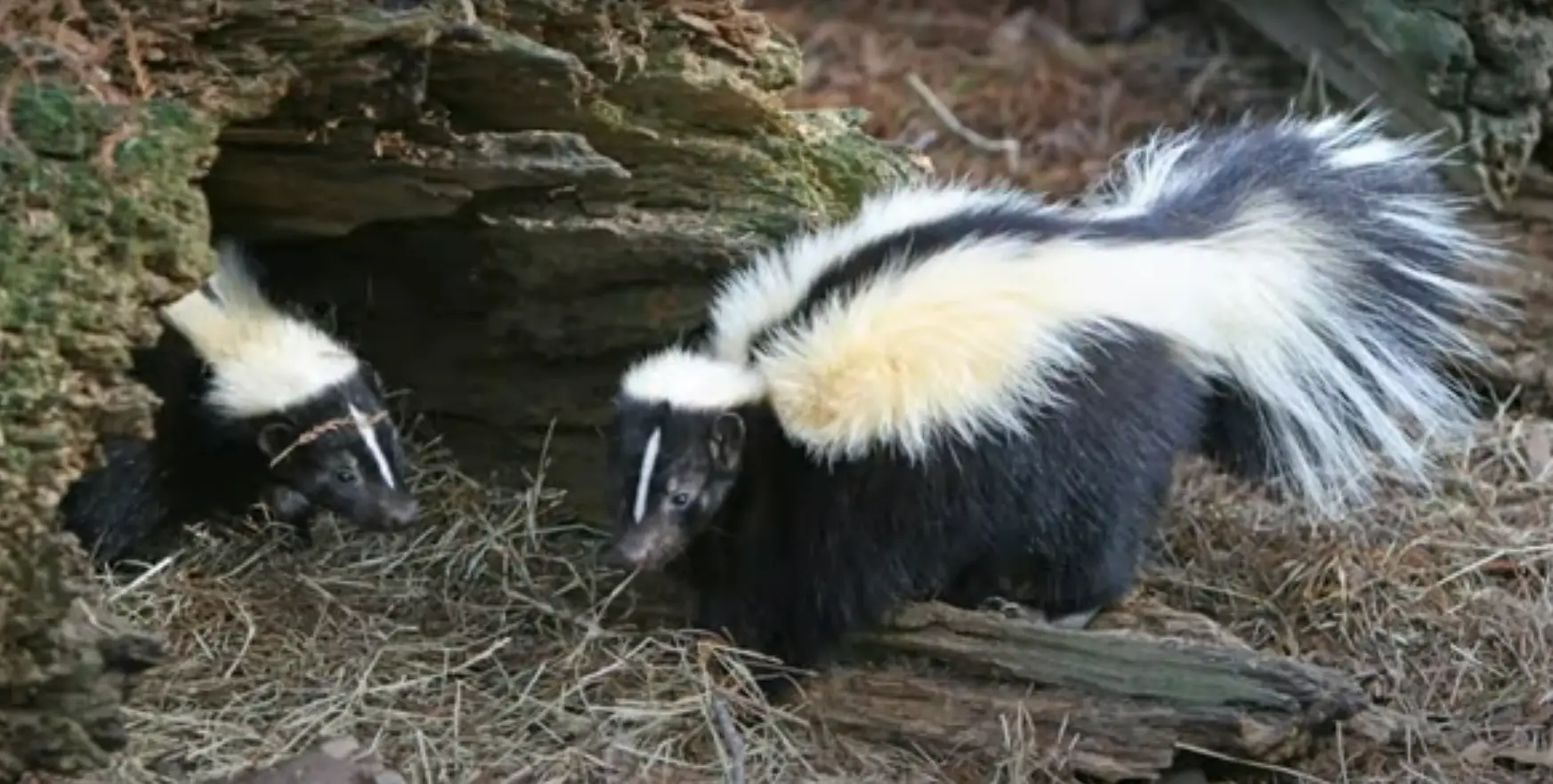
How To Get Rid Of Skunks Under a Shed
1. Install a Wire Mesh Fence
A wire mesh fence can be installed around the perimeter of your shed and should extend a few feet underground. The mesh should be no larger than 1-inch to prevent the skunks from squeezing through. [1]
2. Sprinkle Kitty Litter Nearby
Kitty litter can be scattered around the shed to deter skunks from entering. Skunks do not like cats and will avoid any areas that smell of cat urine.
3. Use Cotton Balls Soaked in Ammonia
To keep skunks away, put some cotton balls soaked in ammonia at different spots around the perimeter of your shed. The strong odor of ammonia is considered unpleasant by many animals, among them skunks. To keep skunks away, soak cotton balls in the substance and place them near possible entry points. The smell will be stronger when wet. Change out the cotton balls every week or two to ensure that the smell remains strong and effective. Also be sure to spray some additional ammonia solution around any possible points of entry and around the perimeter of your shed for extra protection. This should help discourage skunks from taking up residence under your shed.
4. Try Apple Cider Vinegar in a Plastic Bag
Skunks are known to dislike the smell of apple cider vinegar. Place some items in a plastic bag and hang it around your shed or near any entry points. Be sure to replace the bag every few days, as the smell will start to fade after that. This method should help repel skunks from trying to take up residence under your shed.
5. Install Motion-Activated Sprinklers
Using motion-activated sprinkler systems is an effective method to prevent skunks from entering your shed. The motion of the sprinklers will startle the skunks and make them think twice about coming back. This method is effective because it prevents access to the shed without using any harsh chemicals or odors that may be hazardous to people and pets. Just be sure to test out your system regularly in order to ensure it’s working properly.
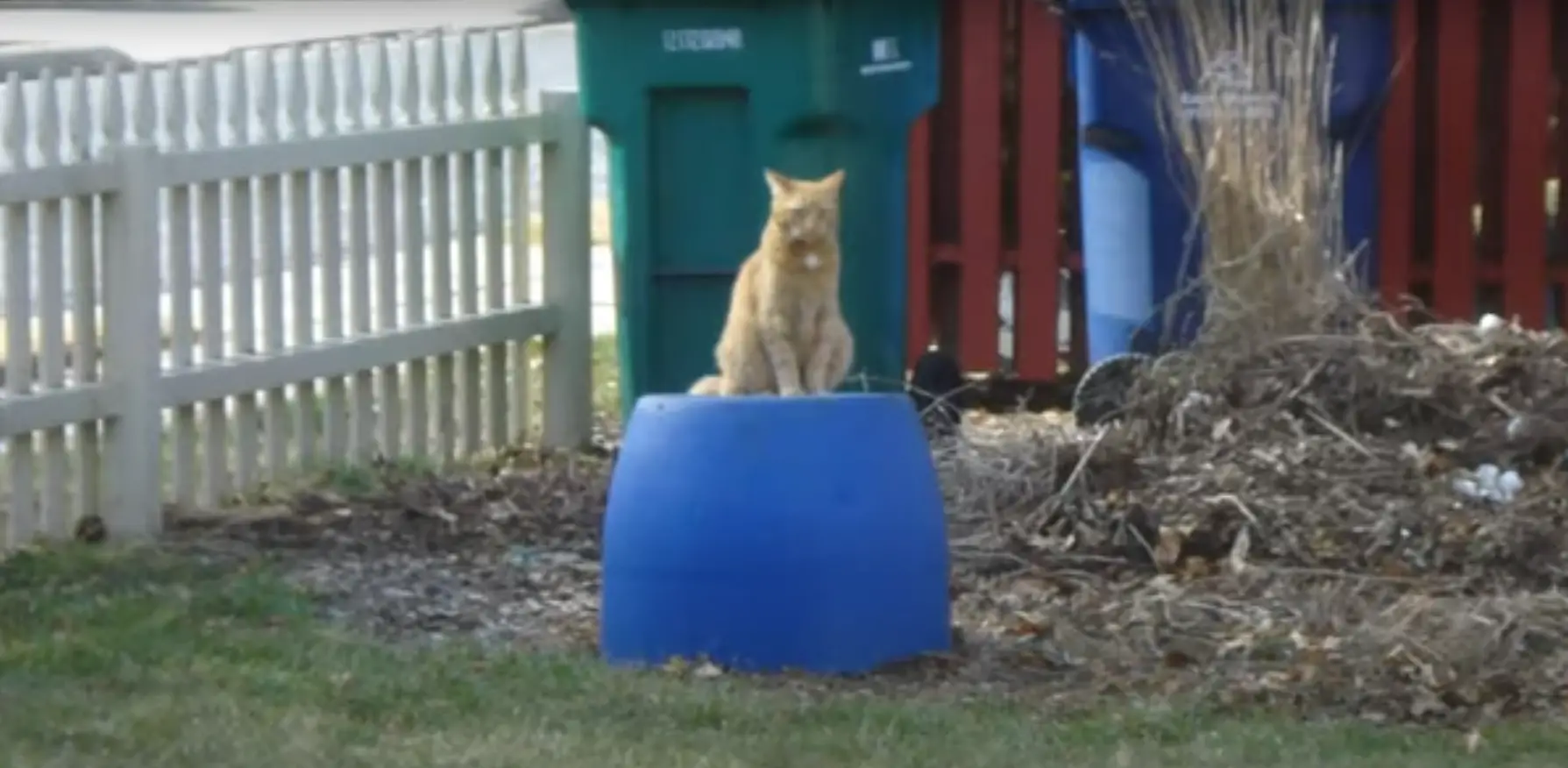
6. Add Mothballs to Your Yard
The strong smell of mothballs is unpleasant for most animals, including skunks. Place several mothballs around the perimeter of your shed and near any potential entry points. Be sure to replace them every few weeks for maximum effectiveness. However, be aware that mothballs can be toxic and should not be used too close to people or pets. [2]
7. Install Predator Deterrent Lights
Adding predator deterrent lights to your shed can help make skunks think twice before taking up residence. The flashing lights will startle skunks and make them think a predator is nearby, discouraging them from entering the area. Be sure to choose LED lights that are designed specifically for this purpose, as regular lights may not be effective enough. To ensure that the lights are working correctly, remember to check the batteries regularly.
8. Use an Ultrasonic Skunk Repellent
High-frequency sound waves are utilized by ultrasonic skunk repellents to make the area near your shed less inviting to skunks. These devices are to be safe and effective, posing any harm to people or. Make sure to install devices according to the manufacturer’s in order to maximize its effectiveness. Also be sure to check the batteries periodically in order to ensure it is working properly.
9. Spread Predator Urine Around Your Shed
Predator urine, such as fox or coyote urine, can be a great way to keep skunks away from your shed. Skunks will think twice about entering the area if they believe there is a predator nearby. Be sure to spread it around any potential entry points and near the perimeter of your shed. Make sure to check the scent periodically in order to ensure it is still effective.
10. Utilize the Power of Spicy Spray
Spicy spray is made from a blend of hot peppers and garlic that can be used to deter skunks. Fill up a spray bottle with the mixture and spray it around any potential entry points for the skunks. Be sure to check the spicy spray regularly in order to ensure it is still effective. This method should help keep skunks away from your shed without posing any harm to people or pets. [3]
11. Scatter Citrus Peels Around the Shed
Skunks dislike the smell of citrus, so scattering lemon or orange peels around your shed can help repel them. Be sure to replace the peels every few days as the scent will start to fade over time. This is a safe and natural way to deter skunks from entering your property without using any harsh chemicals or odors.
12. Get a Cat or Dog
Having a cat or dog can be an effective way to keep skunks away from your shed. The presence of these animals will discourage skunks from entering the area, as they may think there is a potential predator nearby. Make sure to supervise your pet when it is outside, as you should never allow them to harm any wild animals.
13. Catch and Relocate the Skunks
If all else fails, you may need to catch and relocate the skunks. This should only be done as a last resort, and always with the help of a professional animal removal service. Relocating skunks can be dangerous, so make sure you know what you are doing before attempting this method. Once the skunk is removed from the area, make sure to close off any potential entry points that it might have used. [4]
14. Call a Professional
If you are unable to remove the skunks from your property on your own, it is best to call a professional animal removal service. They will be able to safely and effectively get rid of the skunks without posing any harm to people or pets. Make sure that you take all of the necessary precautions before attempting to remove the skunks yourself, as this can often be a dangerous task. A professional can ensure that everything is done correctly and that there are no dangers posed by the process.
By following these steps, you should be able to successfully get rid of skunks living under your shed in no time! Remember, always use humane methods when dealing with wild animals, so make sure not to use any harsh chemicals or odors. With a bit of effort, you can keep your shed skunk-free and enjoy your outdoor space in peace.
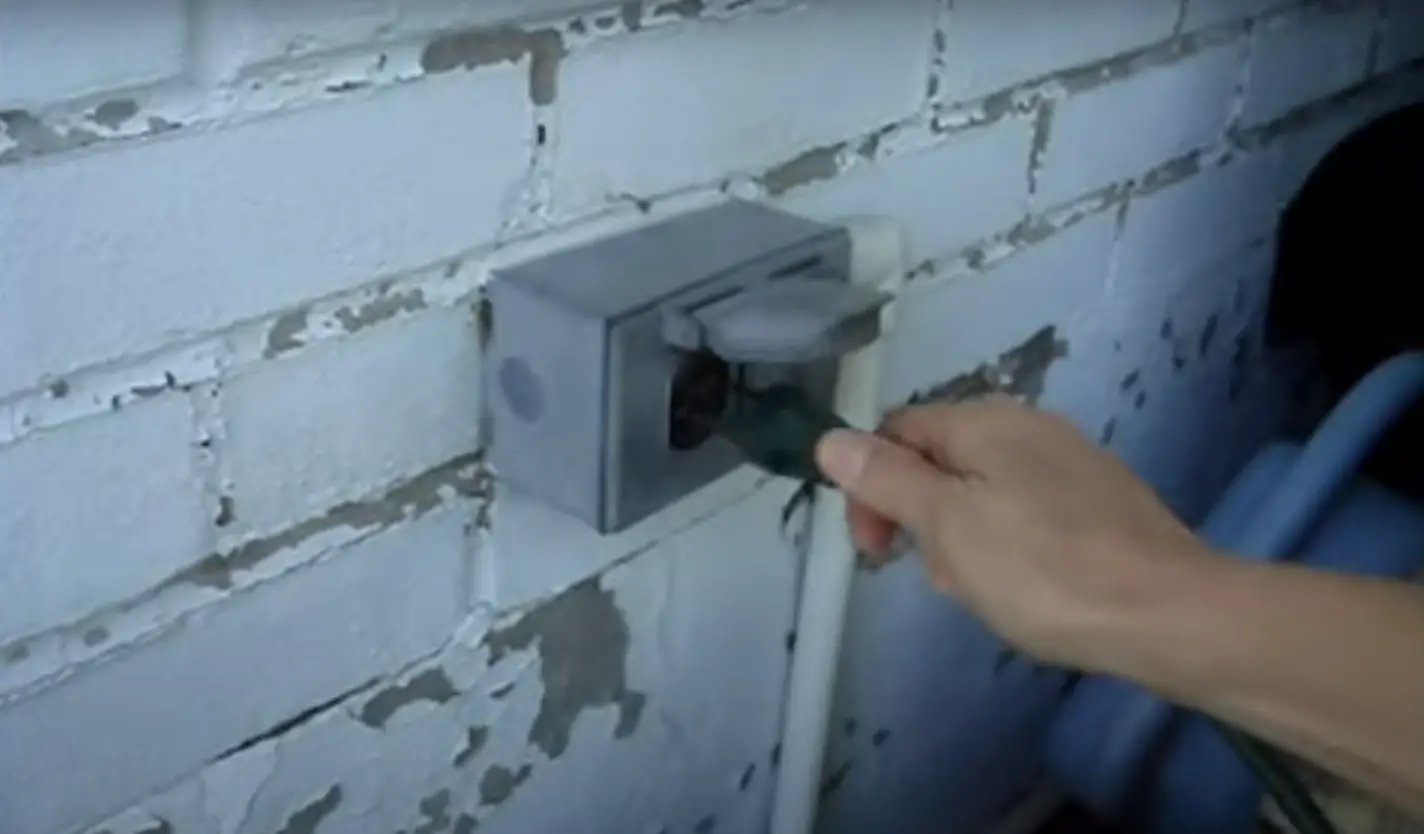
How to Get Rid of Skunks with Repellents?
Using a repellent is an effective and humane way to get rid of skunks that are living in or around your shed. Repellents work by creating an unpleasant environment that the skunk will want to avoid. The two most common types of repellent are chemical and electronic, both of which can be purchased at retail stores or online.
Electronic repellents use sound, light, or vibration to scare skunks away. These devices can be placed in or around your shed and typically emit an ultrasonic sound that is only audible to animals. Electronic repellents should be used in combination with other methods for best results and should be checked regularly for optimal performance.
Using a combination of chemical and electronic repellents can help ensure that the area around your shed stays skunk-free. However, it’s important to note that while repellents may work initially, they are not a long-term solution and may require frequent reapplication in order to remain effective. Additionally, some skunks may become accustomed to the repellent over time and no longer be deterred by it.
If you’re having trouble dealing with skunks around your shed, it’s best to contact a wildlife removal expert who can safely and humanely remove the animal from your property. They will be able to provide advice on how to properly use repellents and other methods for deterring skunks in the future. [5]
Where Do Skunks Live?
Skunks are nocturnal animals, and they often seek shelter in dark places like under sheds, decks, or porches. Although skunks can live in burrows made by other animals, the most commonly seen type of skunk habitat is one that the animal has created for itself. Skunks dig out shallow dens for themselves to live in near a food source.
If your shed provides protection from predators and access to food sources such as insects, vegetables, fruit, pet food scraps, or garbage cans – all of which can attract skunks – then it’s likely a skunk will take up residence beneath it.
To get rid of the skunk living under your shed and prevent future infestations, you’ll need to understand the skunk’s behavior, remove any potential food sources, and use a combination of physical barriers, repellents, and trapping. [6]
What to Do If You Find a Skunk Den?
If you find a skunk denning under your shed, the best thing to do is to call a professional wildlife control operator. These professionals can safely and humanely remove the skunks from your property. They will be able to assess the situation and decide what is the best course of action based on their experience and local regulations.
The wildlife operator may recommend that you take steps to prevent any future skunks from taking up residence in or near your shed. These steps may include blocking off access points with metal flashing, using ammonia-soaked rags at entry points, installing motion-activated lights or sprinklers around the perimeter of your shed, as well as keeping pet food indoors and disposing of garbage regularly.
Once these measures have been taken and the skunk has been removed from your property, it is important to keep an eye out for any signs of a new den near your shed. Regularly inspect the area after dark as this is when skunks will most likely be active. If you notice any signs of a new den such as digging, tracks or droppings, contact a wildlife control operator immediately in order to prevent any more skunks from taking up residence near your shed.
Ultimately, getting rid of skunks under your shed requires a multi-faceted approach and should be handled by a professional wildlife control operator. They can assess the situation, take all necessary steps to safely remove the skunk and help you prevent any future denning activity in or around your shed.
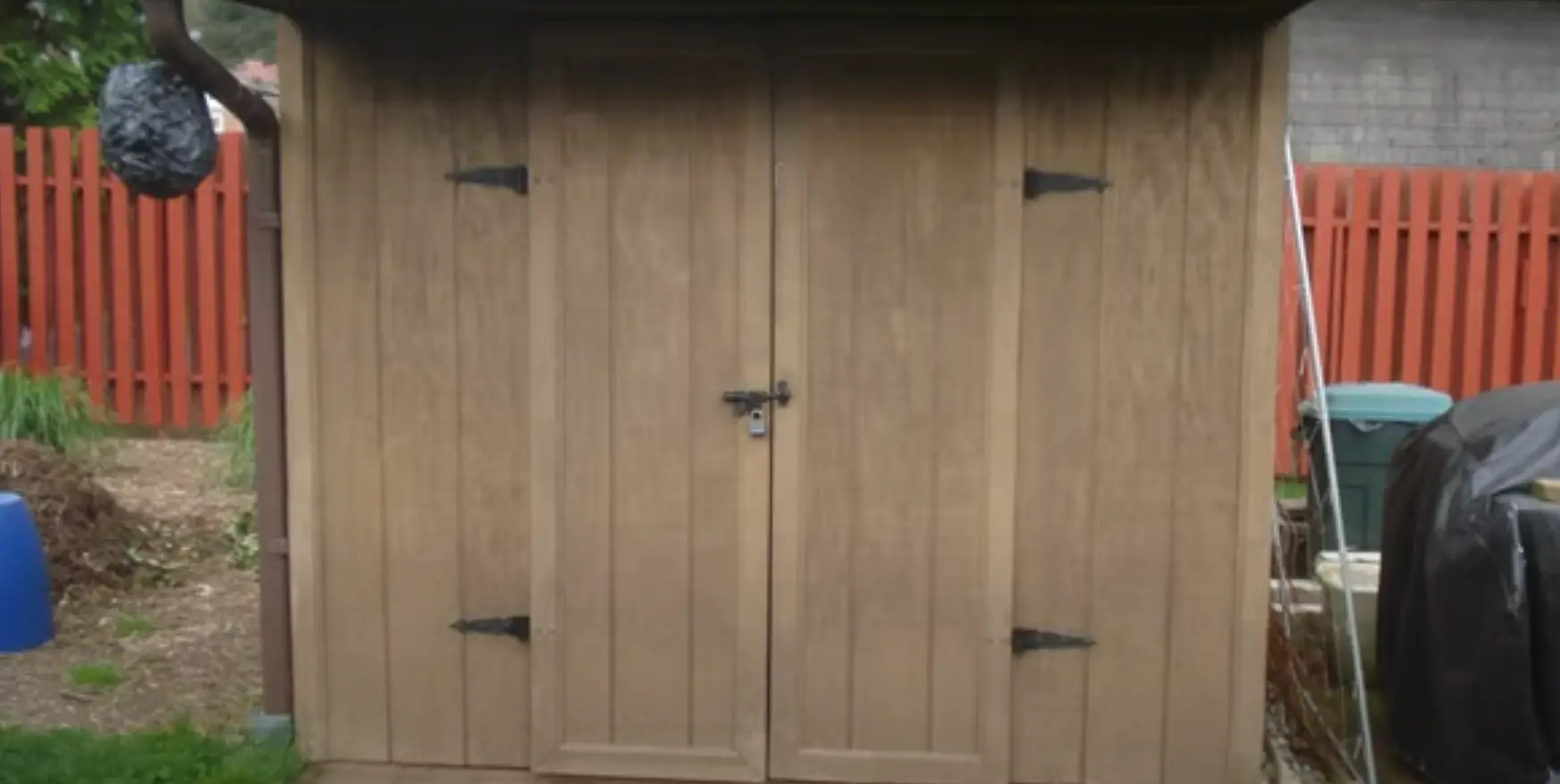
What to Do If a Skunk Sprays You?
If you have been sprayed by a skunk, it is important to act quickly and take the appropriate steps to neutralize the odor. Start by mixing one quart of hydrogen peroxide with 1/4 cup baking soda in a large bowl or bucket. Apply the mixture directly to your skin, making sure to rinse it off after 10 minutes as extended contact can cause skin irritation. If you are still unable to reduce the smell, use a shampoo designed to remove odors such as vinegar-based products.
In addition, there are a number of home remedies that can be used to help reduce or eliminate skunk odors. Boiling two tablespoons of vinegar in a gallon of water for 15 minutes is an effective way to neutralize strong smells. Additionally, using tomato juice or a commercial deodorizer designed for removing skunk odors can also help combat the smell.
Finally, if the smell persists despite all your efforts, it may be necessary to contact a professional cleaner who specializes in removing stubborn pet odors. Such services may be expensive but could prove well worth the cost when compared to dealing with persistent bad smells.
By following these steps and using the appropriate methods for neutralizing skunk odors, you should be able to effectively get rid of any smells caused by a skunk.
Remember that prevention is always the best way to handle skunks and other pests on your property. In addition to getting rid of skunks under your shed, it is also important to check around your property for possible entry points and close up any gaps or holes. This will help prevent future problems with unwanted visitors as well as reduce the chances of being sprayed again in the future. [7]
FAQ
How do you get skunks to leave?
The most effective way to get skunks to leave an area is by eliminating any food sources they could be attracted to. This includes unsecured garbage cans, pet food left outdoors, rodents and other small animals that may have taken up residence in the shed or yard, and any gardens or compost piles. To discourage them from returning, you should also seal up any holes or cracks around the perimeter of your shed that might provide entry for a skunk.
How can I keep skunks away from my property?
To prevent skunks from entering your property in the future, there are several steps you can take: 1. Secure all food sources such as garbage cans, pet food, bird feeders and compost piles;
- Eliminate any rodent or small animal populations living in and around the shed;
- Seal up any holes or cracks around the perimeter of your shed;
- Install motion-activated lights or sprinklers;
- Maintain a clean yard with minimal vegetation which can provide cover for skunks to hide in;
- Utilize natural repellents such as predator urine, castor oil, ammonia, garlic and cayenne pepper.
Do skunks spray when scared?
Yes, skunks will spray when scared or startled. Skunk spray is made up of sulfur-based chemicals that can be very smelly and long-lasting. If a skunk feels threatened, it will stand up on its hind legs and arch its back as a warning before spraying. To avoid being sprayed by a skunk, it’s important to make sure you don’t startle them or get too close.
What should you do if you come into contact with a skunk?
If you have an encounter with a skunk, it’s best to stay calm and slowly back away from it until you are out of its line of sight. If you startle it, there is a good chance it will spray you. If this happens, avoid touching or rubbing the affected areas as the scent can be difficult to remove without a special skunk odor remover. If there is any skin contact, it’s best to wash the area with soap and water as quickly as possible. It’s also important to keep your pets away from skunks as they are at risk of being sprayed if they get too close.
What do skunks hate most?
Skunks are easily repelled by strong odors and bright lights. A combination of these two elements can be an effective deterrent for skunks living under a shed or other structure. One way to deter skunks is to place strips of cloth soaked in ammonia around the perimeter of the shed. Ammonia has a very pungent odor that most animals, including skunks, find distasteful. The strips should be replaced every few weeks or when the smell fades away. Motion-activated lights can also help scare off skunks from under your shed. Place one or two bright lights at the entrance and make sure they turn on every time something moves near them. Again, this will only work if done consistently and with the right lighting.
Does vinegar scare away skunks?
The short answer is yes! Vinegar has a strong odor that skunks find unpleasant, and spraying it around the perimeter of your shed or structure can help keep them away. Try mixing one part vinegar with two parts water inside a spray bottle and liberally spray around the area where you suspect skunks are living. Reapply every few weeks to ensure that the scent remains strong enough to deter them. If these methods do not work, another option is to contact an animal control expert who can humanely remove the skunk(s) from under your shed. They will be able to take all necessary steps to make sure the animals are safely removed and relocated.
How do I keep skunks out of my crawl space?
The best way to keep skunks out of your crawl space is by making sure that there are no openings for them to get in. You should inspect the area around your home and seal any openings or gaps, such as those around pipes or vents, with hardware cloth and caulk. Additionally, you can install motion-activated lights or sprinklers near these entry points to deter skunks from entering the space. Finally, you can also install a mesh barrier around the perimeter of your crawl space to prevent animals from entering. If these methods fail, then you may need to contact a professional wildlife removal service for assistance. They will be able to remove any skunks living underneath your shed and help you keep them away in the future.
Useful Video: Get Rid of Skunk Under Shed
Conclusion
Once the skunk is removed, it is important to keep your shed away from other potential wildlife. You can do this by trimming trees and bushes around the area and keeping food sources like pet food and garbage out of reach. Additionally, you should add mesh or wire screens to all openings in your shed as a form of prevention for future intrusions. Skunks are wild animals and removing them can be tricky, but with these tips you should be able to get rid of any skunks under your shed without any harm coming to either them or you.
References:
- https://www.torontowildlifecentre.com/wildlife-emergency-rescue-hotline/conflicts-with-wildlife/common-skunk-problems/skunk-living-in-your-shed-or-deck/
- https://www.hgtv.com/outdoors/gardens/animals-and-wildlife/making-a-stink-how-to-keep-skunks-out-of-your-garden
- https://critterwranglerstn.com/wildlife-control-powell/5-secrets-to-keeping-skunks-away-from-your-home-part-1/
- https://plasticinehouse.com/how-to-get-rid-of-skunks-under-deck-shed/
- https://www.skedaddlewildlife.com/location/whitby/blog/get-rid-of-skunks-living-under-shed/
- https://www.haltonwildlife.ca/get-rid-skunks-living-deck-shed/
- http://wildliferemovalusa.com/skunk-how-to.html






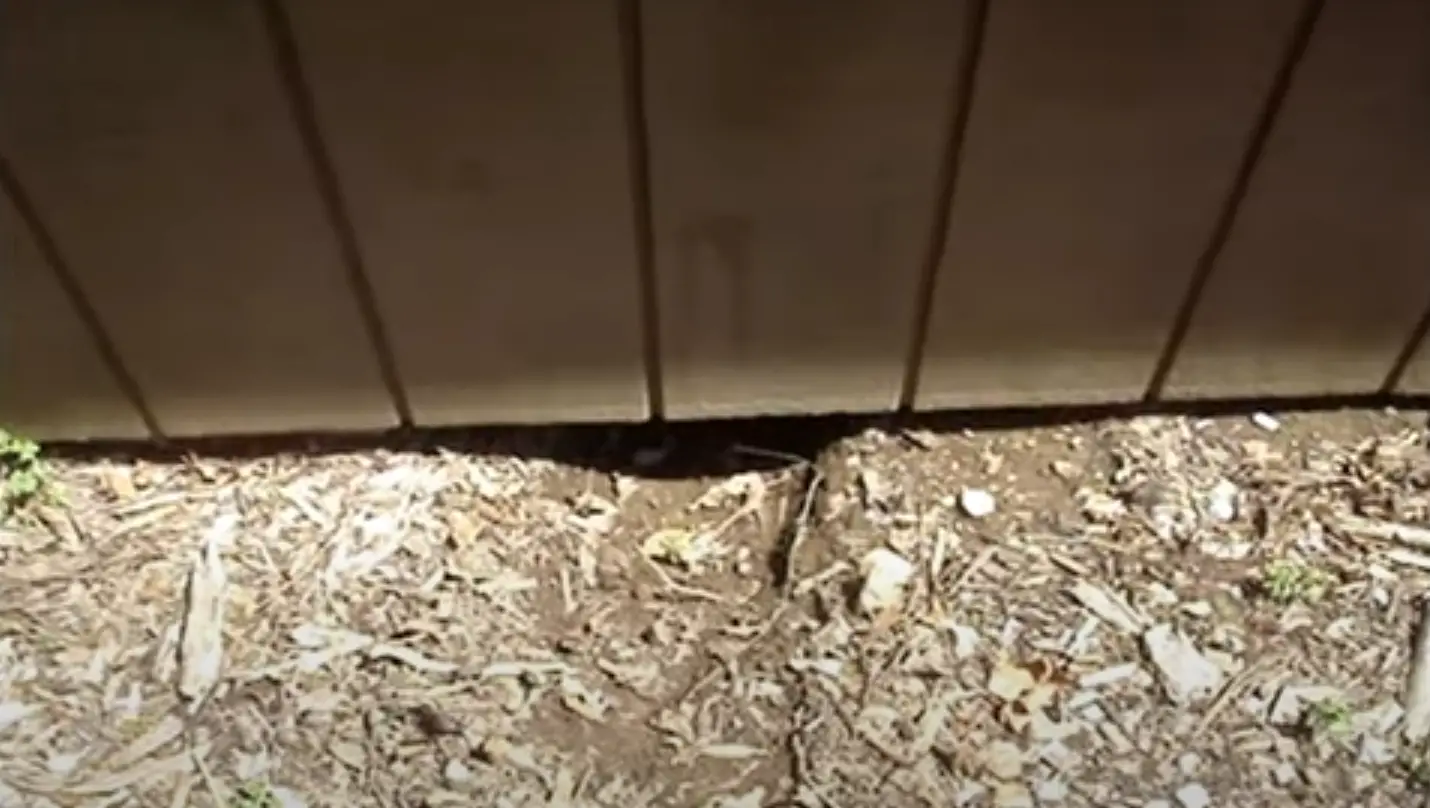
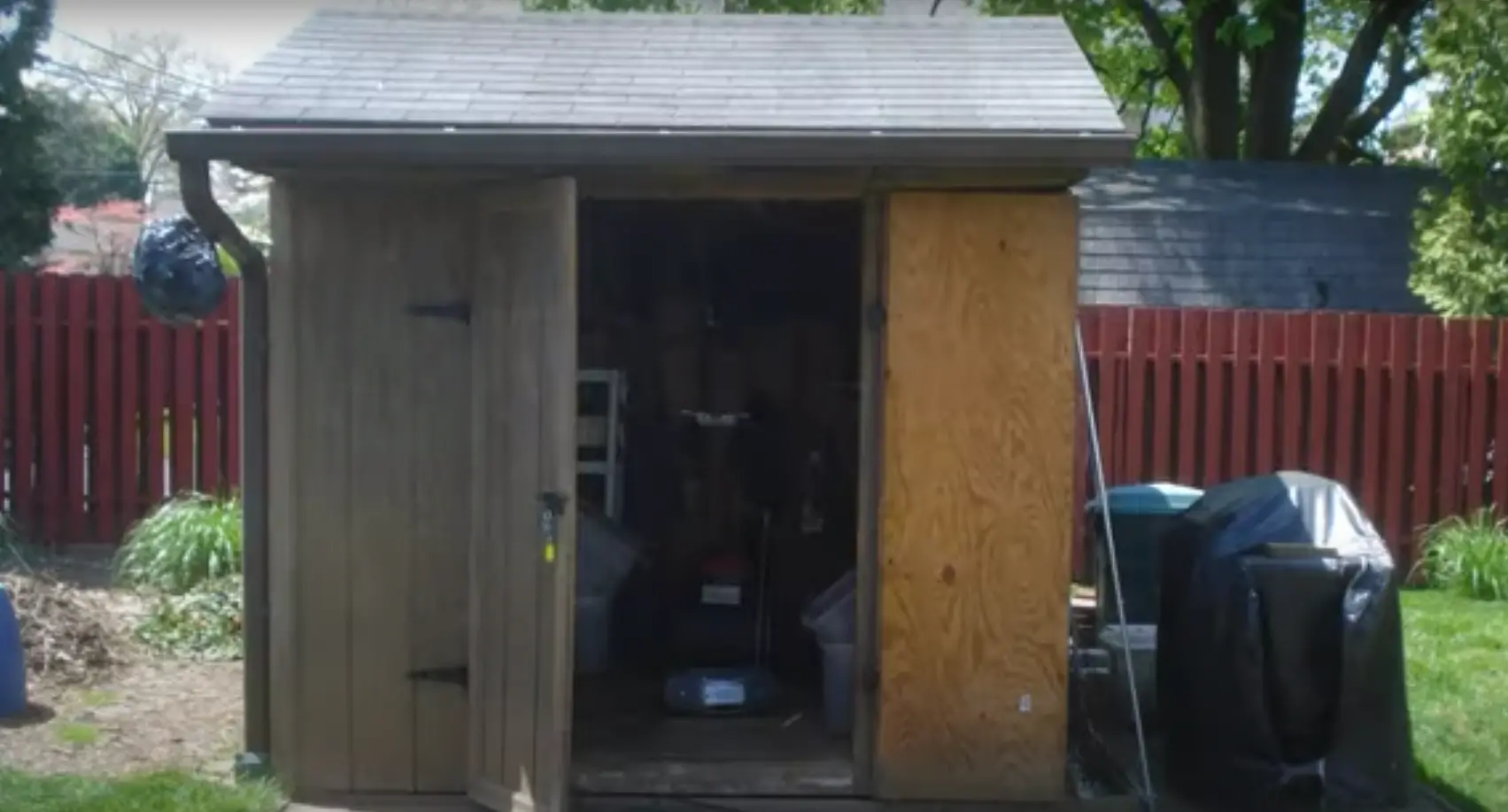



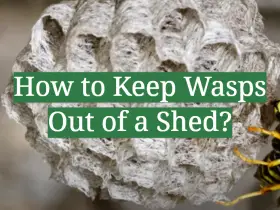
Leave a Reply
View Comments